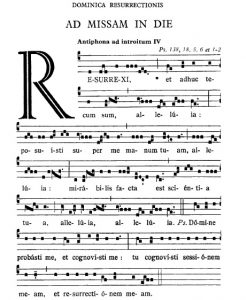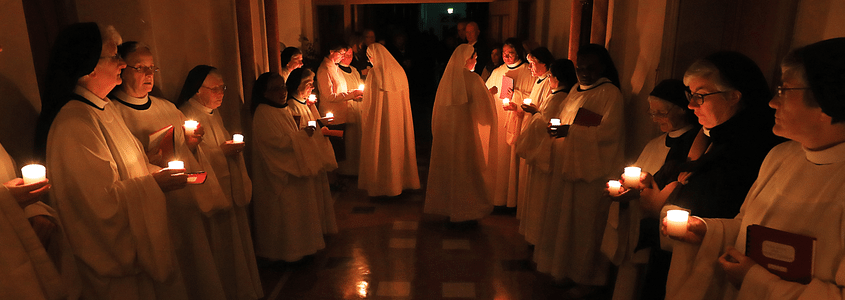Reflection for Easter Sunday
I have risen, and I am with you still, alleluia. You have laid your hand upon me, alleluia. Too wonderful for me, this knowledge, alleluia, alleluia. (cf. Ps 138 [139]:18, 5-6)
The choice of these lines from psalm 138 for Easter Sunday is quite extraordinary and daring. We might think from the first phrase, I have risen, and I am with you still, that the words are spoken by the risen Christ to us, his followers. We are used to hearing the words of his promise, “Behold, I am with you always, to the end of the world” (Mt 28:20), repeated to us in the liturgy during Eastertide. But no – it is clear from the second phrase, You have laid your hand upon me, that these words are addressed by Christ to the Father, the one who laid a hand of power upon him and raised him from the dead. On this Easter day, Christ sings in praise and in amazement to his Father: he who had emptied himself, for a time, of the glory of the divinity which is his, and had taken the form of a servant in his incarnation, has now passed through the tomb of death and is restored to divine glory. It is as if he closed his eyes in death on the cross, and now opens them again and realises what has happened because the Father laid that hand of might upon him. “He contemplates His glory, the boundless, golden, eternal glory which henceforth is proper to His human nature also”* – and he is amazed! Too wonderful for me, this knowledge! cries the antiphon. The singer is stunned, awestruck.
In the risen Christ our human nature has, as it were, entered a place where the light is stunningly bright, the food is sumptuously rich; it is beyond our wildest dreams; it is life at a level of intensity we have never before experienced. It is like that moment when something wonderful happens to us and we hold our hands up to our face and cry “Oh no!” – not that we are rejecting it, but that it is utterly beyond our expectations and comprehension.
Just as we gazed at the cross and the suffering of Jesus in Holy Week, so now we also gaze on him, risen from the dead, contemplating this mystery with wonder and awe. We did not fully comprehend the cross (because nobody can); now we do not fully comprehend the resurrection (because nobody can), but we ponder it and let its reality and meaning sink into our hearts. In each yearly celebration the depths of the meaning of the paschal mystery penetrate us a little more.
There is much wonderful music with which the Mass of Easter Day might fittingly begin – but let us not forget (or let us rediscover) what the Church’s magnificent tradition offers us for this occasion. There are a number of English settings available, as well as the traditional chant.
* Dom Dominic Johner, The Chants of the Vatican Gradual, p. 178
Here is the Latin chant version of this antiphon:

You can listen to it here:
https://www.youtube.com/watch?v=RS8USaGrwpk
(monks of Triors, via ccwatershed)




Comments are closed.